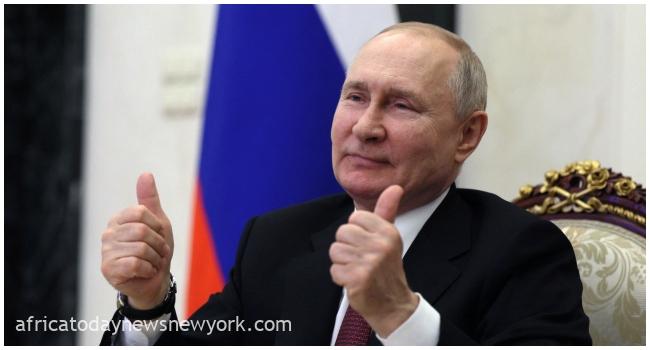The President of Russia, Vladimir Putin has secured another six-year term in office in an election which has been deemed controversial in some quarters, Africa Today News, New York reports.
Despite facing widespread condemnation and controversy, the victory has now solidified Putin’s position as one of the longest-serving leaders in Russian history.
Africa Today News, New York reports that the election, marked by a lack of viable opposition candidates, saw Putin projected to win with an overwhelming 87 per cent of the votes, as reported by the government-run VTsIOM pollster. However, the legitimacy of the election has been called to question by critics both within and outside Russia.
The campaign period was marred by escalating tensions with Ukraine, as deadly bombardments and incursions into Russian territory by pro-Kyiv sabotage groups coincided with the voting process.
Ukrainian President Volodymyr Zelensky condemned Putin as a “dictator” and accused him of abusing power for personal gain.
International observers, including the European Union (EU), labelled the election as neither “legal, free, nor fair,” echoing concerns about the lack of genuine competition and the stifling of dissent within Russia.
Despite the absence of significant challengers, supporters of the late opposition leader Alexei Navalny staged protests and urged voters to boycott the election. Navalny, who died in custody the previous month, had been a vocal critic of Putin’s regime and had attempted to run against him in the 2018 election.
In response to the election results, Navalny’s wife, Yulia Navalnaya, honored her late husband by casting her ballot with his name written on it at the Russian embassy in Berlin. Others within Russia expressed their opposition through symbolic gestures, such as spoiling ballots with Navalny’s name or participating in protests.
However, dissent within Russia has been met with harsh repression, with reports of arrests and crackdowns on activists and protesters. The authorities warned against any form of election-related protests, further tightening control over public expression.
Meanwhile, the conflict with Ukraine continued to escalate, with reports of Ukrainian strikes on Russian territory resulting in casualties. The ongoing violence underscores the challenges facing Putin as he enters another term in office.
Putin, who has been in power since 1999, is poised to extend his rule until at least 2030. In his pre-election address, he called for unity amid what he described as a “difficult period” for Russia.

